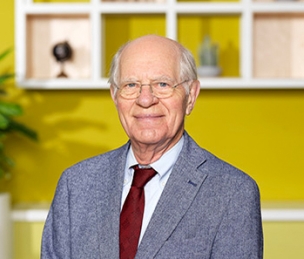Displaying 1 - 11 of 11
-
Levelt, W. J. M. (2020). On becoming a physicist of mind. Annual Review of Linguistics, 6(1), 1-23. doi:10.1146/annurev-linguistics-011619-030256.
Abstract
In 1976, the German Max Planck Society established a new research enterprise in psycholinguistics, which became the Max Planck Institute for Psycholinguistics in Nijmegen, the Netherlands. I was fortunate enough to be invited to direct this institute. It enabled me, with my background in visual and auditory psychophysics and the theory of formal grammars and automata, to develop a long-term chronometric endeavor to dissect the process of speaking. It led, among other work, to my book Speaking (1989) and to my research team's article in Brain and Behavioral Sciences “A Theory of Lexical Access in Speech Production” (1999). When I later became president of the Royal Netherlands Academy of Arts and Sciences, I helped initiate the Women for Science research project of the Inter Academy Council, a project chaired by my physicist sister at the National Institute of Standards and Technology. As an emeritus I published a comprehensive History of Psycholinguistics (2013). As will become clear, many people inspired and joined me in these undertakings. -
Levelt, W. J. M. (2020). The alpha and omega of Jerome Bruner's contributions to the Max Planck Institute for Psycholinguistics. In M. E. Poulsen (
Ed. ), The Jerome Bruner Library: From New York to Nijmegen (pp. 11-18). Nijmegen: Max Planck Institute for Psycholinguistics.Abstract
Presentation of the official opening of the Jerome Bruner Library, January 8th, 2020Additional information
Link to booklet - The Jerome Bruner Library: From New York to Nijmegen -
Levelt, W. J. M. (1992). Accessing words in speech production: Stages, processes and representations. Cognition, 42, 1-22. doi:10.1016/0010-0277(92)90038-J.
Abstract
This paper introduces a special issue of Cognition on lexical access in speech production. Over the last quarter century, the psycholinguistic study of speaking, and in particular of accessing words in speech, received a major new impetus from the analysis of speech errors, dysfluencies and hesitations, from aphasiology, and from new paradigms in reaction time research. The emerging theoretical picture partitions the accessing process into two subprocesses, the selection of an appropriate lexical item (a “lemma”) from the mental lexicon, and the phonological encoding of that item, that is, the computation of a phonetic program for the item in the context of utterance. These two theoretical domains are successively introduced by outlining some core issues that have been or still have to be addressed. The final section discusses the controversial question whether phonological encoding can affect lexical selection. This partitioning is also followed in this special issue as a whole. There are, first, four papers on lexical selection, then three papers on phonological encoding, and finally one on the interaction between selection and phonological encoding. -
Levelt, W. J. M. (1992). Fairness in reviewing: A reply to O'Connell. Journal of Psycholinguistic Research, 21, 401-403.
-
Levelt, W. J. M. (1992). Psycholinguistics: An overview. In W. Bright (
Ed. ), International encyclopedia of linguistics (Vol. 3) (pp. 290-294). Oxford: Oxford University Press. -
Levelt, W. J. M. (1992). Sprachliche Musterbildung und Mustererkennung. Nova Acta Leopoldina NF, 67(281), 357-370.
-
Levelt, W. J. M. (1992). The perceptual loop theory not disconfirmed: A reply to MacKay. Consciousness and Cognition, 1, 226-230. doi:10.1016/1053-8100(92)90062-F.
Abstract
In his paper, MacKay reviews his Node Structure theory of error detection, but precedes it with a critical discussion of the Perceptual Loop theory of self-monitoring proposed in Levelt (1983, 1989). The present commentary is concerned with this latter critique and shows that there are more than casual problems with MacKay’s argumentation. -
Levelt, W. J. M. (1991). Die konnektionistische Mode. Sprache und Kognition, 10(2), 61-72.
-
Levelt, W. J. M. (1991). Lexical access in speech production: Stages versus cascading. In H. Peters, W. Hulstijn, & C. Starkweather (
Eds. ), Speech motor control and stuttering (pp. 3-10). Amsterdam: Excerpta Medica. -
Levelt, W. J. M., Schriefers, H., Vorberg, D., Meyer, A. S., Pechmann, T., & Havinga, J. (1991). Normal and deviant lexical processing: Reply to Dell and O'Seaghdha. Psychological Review, 98(4), 615-618. doi:10.1037/0033-295X.98.4.615.
Abstract
In their comment, Dell and O'Seaghdha (1991) adduced any effect on phonological probes for semantic alternatives to the activation of these probes in the lexical network. We argue that that interpretation is false and, in addition, that the model still cannot account for our data. Furthermore, and different from Dell and O'seaghda, we adduce semantic rebound to the lemma level, where it is so substantial that it should have shown up in our data. Finally, we question the function of feedback in a lexical network (other than eliciting speech errors) and discuss Dell's (1988) notion of a unified production-comprehension system. -
Levelt, W. J. M., Schriefer, H., Vorberg, D., Meyer, A. S., Pechmann, T., & Havinga, J. (1991). The time course of lexical access in speech production: A study of picture naming. Psychological Review, 98(1), 122-142. doi:10.1037/0033-295X.98.1.122.

Share this page